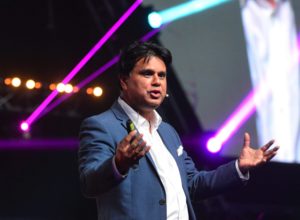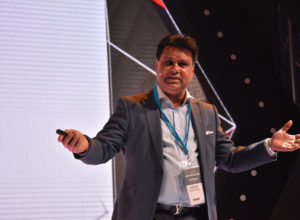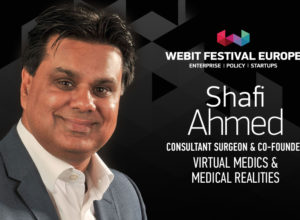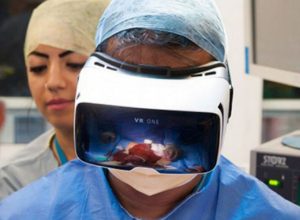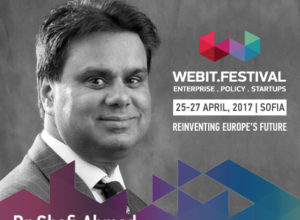Tag: shafi ahmed
The future of Health at Webit.Festival Europe 2018
Health is so important to all of us, it requires change. How do we create a better future for all of us?
In healthcare around the world there's change in quality, sometimes poor access. How do we enable technology to deliver the things that we all aspire? - to make healthcare free for all at a high quality. That's the role of Health.Summit chaired by prof. Shafi Ahmed. Medicine is the perfect example of how the fourth industrial revolution is changing all of us.What about Europe?
We need data and insights on the health of European citizens, on how we organize care, and on how much our health systems cost. The EC joined forces with the OECD and the Observatory on Health Systems and Policies, and analyzed each EU country. The reports show that our healthcare needs to be more effective, accessible and resilient. For example, 80% of healthcare costs are spent on treating chronic diseases, but just a fraction on prevention. Shifting on prevention not only tackles inequalities in health and quality of life, but also offers an enormous economic return. Today, one in four patients have no access to a family doctor or a local health center, and have to go to an emergency department. With available and affordable primary care we can avoid unnecessary hospital admissions. Too often patients are searching for the best possible treatment in a maze of scattered health services. Integrated care, where all care providers work more closely together delivers better results for patients. "The state of Health" in the EU links the strengths and challenges in the different European countries to common health priorities across the EU. The reports help policymakers make relevant and efficient choices so all of us can enjoy a healthy future.Teaching tens of thousands of people together to improve the education resources.
As a global surgeon prof. Shafi Ahmed thinks about how to scale the learning and education around the world. Now we are connected with cables, by phones and satellites. And because we are connected now we can reach far more. We have social media to connect with people. We are changing the paradigm of the doctor-patient relationship using AI, chat bots, deep machine learning, avatars and holograms. In the next 2-5 years we are going to communicate in a different way. The human interaction will little bit disappear because it is too expensive.
I thought "How can I connect with people around the world? Let's connect my avatar with other avatars in America, in India. Can they come to my theater together in this virtual space? They call me the Virtual Surgeon.
[embed]https://www.youtube.com/watch?v=-4T49_zz3HA[/embed]
Imagine someone operating on the other side of the globe, calling you and saying: "I need some advice, can you come?" Plane travel - too long, inefficient. What about transporting yourself as a hologram?
Shafi Ahmed has been spending a lot of time talking about how we use technologies in a way that we haven't done before. And at Webit.Festival Europe 2018 he announced that he and Mr. Martin Dockweiler are launching the first digital hospital in South America. The hospital will be called SAMD (Shafi Ahmed Martin Dockweiler) University Hospital. It will have a center of innovation, research, teaching. They will be testing new technologies.
The future is not today or tomorrow. It's happening all around us as we speak. And that is the future we create for ourselves.Missed the 2018 edition of Webit.Festival Europe? Don’t miss the 2019! Get your super early bird 2in1 tickets – 2 for the price of 1 here!
Technology will give us the tools to disrupt the dogma in...
“Clinical practices are full of dogma and tradition but they want to change. I’m impressed by Bulgaria. You had amazing people here to begin with and all of this happening at Webit is quite a good enabler to think about how to change the world we live in. So please think about disrupting your minds and moving on to a world of exponential medicine”, he told the guests in the packed Blue hall.The famous surgeon is sure that we are approaching the age of singularity - a point at which the machines and computers will become better doctors and surgeons than humans. According to him the best way to facilitate this process is to stop being obsessed with the human touch and the human flavour of clinical practice. The reason for this is that we often visit a doctor for minor problems, like a cough or even a repeat prescription, that we can easily solve online. [caption id="attachment_4960" align="aligncenter" width="640"]
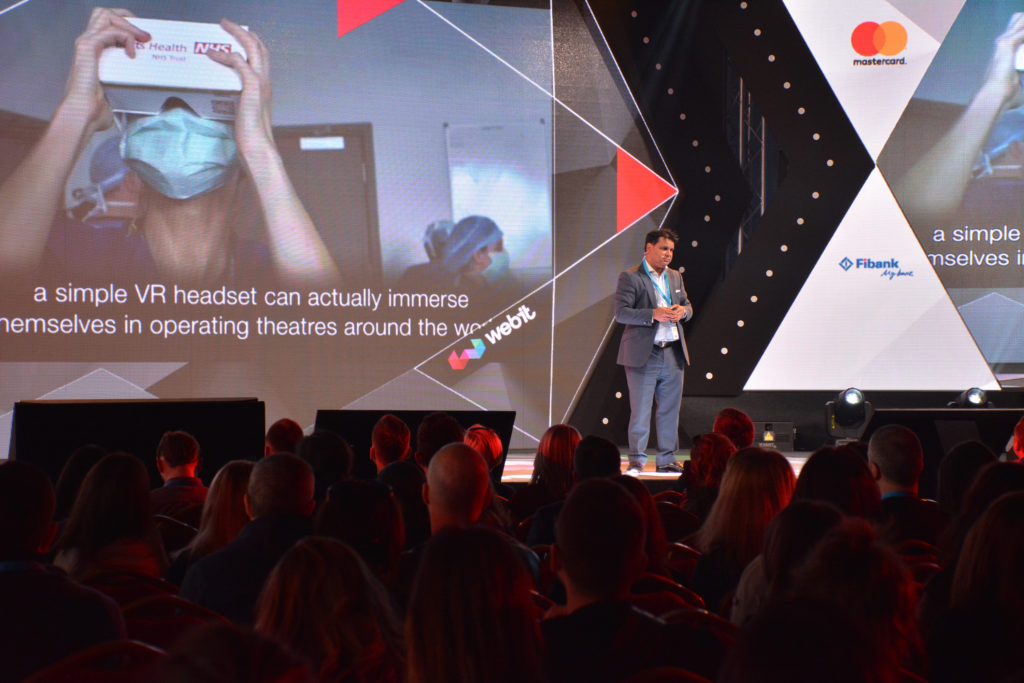 The Co-founder of Virtual Medics & Medical Realities Prof. Shafi Ahmed.[/caption]
In the new digital reality we need access to health services immediately and not waiting for appointments and the new technologies give us the tools to achieve that via Virtual and Augmented Reality and even commonly used software, such as Skype. Suddenly this is disrupting the pure doctor-patient relationship that we have all accepted for being the best.
And there is a lot more to come in the next few years. With avatars and facial recognition technology doctors can transport themselves in VR to other parts of the world and connect to patients there.
The Co-founder of Virtual Medics & Medical Realities Prof. Shafi Ahmed.[/caption]
In the new digital reality we need access to health services immediately and not waiting for appointments and the new technologies give us the tools to achieve that via Virtual and Augmented Reality and even commonly used software, such as Skype. Suddenly this is disrupting the pure doctor-patient relationship that we have all accepted for being the best.
And there is a lot more to come in the next few years. With avatars and facial recognition technology doctors can transport themselves in VR to other parts of the world and connect to patients there.
“They call me a virtual surgeon, but I think we will be a lot more virtual in the future. We are now producing software technology that enable holoportation - visual transportation in VR. Imagine that you need some advice and a person from other parts of the world are transporting themselves to your operating theatre to help you”, Prof. Ahmed said.He thinks that democratizing the medical education is crucial for our future because today more than 5 billion people across the world don’t have access to safe surgery and this costs millions of lives every year. In Barts Medical School, where Shafi Ahmed is an Associate Dean, students are taught to use technology in different ways than the doctors working today. Part of this new agenda is the Barts X Medicine course where students can learn from venture capitalists, entrepreneurs, designers, developers, coders and people from the Silicon Valley. The school is organizing an annual hackaton and the team that wins receive crowdsourced funding for 3 months to create something substantial for patients care. This is a real disruption of education because in the near future we will need creative doctors, who can enable people, create designs, have innovative ideas and know the path from idea to its fruition. Prof. Ahmed pointed out Big Data, Genome Sequencing, AI and 3D Printing as the technologies that are going to bring the biggest changes in healthcare in the years to come. Meanwhile, the development of robotics will lead to automation of diagnostics and surgical procedures and in the long-term to replacing doctors with machines. You may watch Prof. Shafi Ahmed’s full lecture here: If you want to keep up with the latest trend in the world of digital economy and technology, then Webit.Festival is the right place for you. Visit our website and book 2 of our Super Earlybird tickets for Webit.Festival Europe 2018 for just €100. Feel the Webit vibe with some of the best photos from this year’s event! [easingslider id="4954"]
Technology will radically change the way we practice medicine
What do we need to change in our medical education system to answer the needs of tomorrow?
Medical teaching is still very traditional yet technology is advancing exponentially. We need to look at modern methods of teaching the digital doctors of tomorrow. With my company Medical Realities we are utilising augmented and virtual reality to add a different dimension in immersive learning. I have also introduced a new programme called Barts X for our medical students which teaches our students on innovation and entrepreneurship which is essential in creating future leaders.You are known as a visionary. How do you imagine the medicine after ten years?
We are currently undergoing the 4th industrial revolution with the fusion of technologies like AR, VR, Robotics, AI, Big Data and the use of wearable technology which will radically change the doctor patient relationship and how we practise medicine. This is the most exciting time to be involved in medicine. When a patient asks for advice the first point of contact will be artificial intelligence rather than a doctor. The doctor’s role will undoubtedly change. A number of specialties like radiology and dermatology will be largely replaced by sophisticated AI. We will consult remotely using AR and VR and monitor our patients using a mixture of wearables, injectables and ingestible sensors. The cost of genomic profiling will be cheap and will allow us to deliver precision and personalised medicine.What are the biggest medical threats to humanity?
The biggest threats are going to be new infectious diseases like the Ebola virus which can cause devastation quickly. The inequality of the provision of basic surgery globally will affect the well-being of 5 billion people.How will technology improve our health and increase our life expectancy?
There is much interest in looking at ageing as a disease which will be modified with either medicine or a gene altering process allowing us to live longer.What is the biggest technological breakthrough in medicine in recent years?
The unravelling of the complete human genome and reducing the cost of profiling to $1000. The discovery of the CRISPR - Cas9 gene editing which is currently the simplest, most versatile and precise method of genetic manipulation. Here you can see a full list of the confirmed speakers at Webit.Festival, while here you can get all the information you need about the tickets for the event.VR in the world of Digital Health
Use of VR during surgeries? It is reality already!
Digital health is among the topics at Webit Festival - it starts with the champion of new technology in medicine Dr Shafi Ahmed who will show how virtual and augmented reality can revolutionize surgical education and training.
One of the first confirmed speakers for Webit.Festival 2017 in Sofia is Dr Shafi Ahmed - pioneer in the use of virtual reality during surgeries. In fact, he is the first person in the world to live-stream an operation using Google Glass. If you want to hear more from him about this, you will see him on stage during Webit.Festival 2017 from 25-27 April in Sofia. Next year’s edition of the festival promises to bring more than 5000 attendees along with the top executives from world’s most renowned companies, investors, hottest startups and policy makers. Going back to Dr Ahmed, he is world known as one of the best general and colorectal surgeons, operating at The Royal London Hospital. In 2007, he was appointed as a Consultant General, Colorectal and Laparoscopic Surgeon at Barts and the London NHS trust. But the thing he is most popular for is the world’s first live-stream of an operation using Google Glass, which was watched live by 13000 students around the world. Dr Ahmed is also the founder of Medical Realities - an innovative group offering medical training products, specializing in virtual reality, augmented reality and serious games. By using consumer-level virtual reality devices such as the Oculus Rift, Medical Realities can reduce the cost of training, reach a wider audience and provide a completely safe learning environment for medical students. This is a whole new way of education for students, who can take the role of a surgeon and see through his eyes how is the surgery performed. This approach could make healthcare more equitable, making the training of surgeons worldwide a lot better. All you need is a virtual reality headset and you don’t have to travel abroad to train yourself, which is in fact a huge expense. “Surgery has always been learned through apprenticeship. Students must spend time in an operating theatre to get quality training from a mentor. While hospitals have got bigger and surgery has improved, the theatre space around the patient is still limited and it is difficult to provide everyone with a good view. VR lets every student learn from the best seat at the operating table”, says the doctor in one of his interviews. The next step is the development of devices which imitate the physical contact between the user and computer. There are companies developing various gloves or bodysuits which can replicate touch and feel. Dr Ahmed thinks that this devices could be ready for use in 3 to 5 years and they will be the next addition in this new way of education for surgeons. Of course, to know more about his thoughts on the subject, we will have to wait till April and his speech during Webit.Festival. About Webit.Festival 2017: Webit.Festival is the European edition of the Webit Series of events, which will take place in Sofia, Bulgaria, from the 25th to the 27th of April, 2017. The festival consists of several parallel conferences and events, workshops, roundtables and exhibitions. The event is under the patronage of the Mayor of Sofia Mrs Yordanka Fandakova and the European Commission. The agenda includes Tech Summit, Marketing and Innovation Summit, Developers Summit and Smart Cities Summit. Separate area of the festival will be dedicated to startups from Bulgaria and other countries in the world. The agenda for the founders includes conference, meetings with investors, academy for startups and special stage for them to pitch their companies in front of a jury of investors, journalists and leaders of Fortune 500 companies. Webit.Festival is the most influential event on the tech and digital industry in the region. To buy your tickets for Webit.Festival 2017, click here. To apply for speaking, click here. To apply for partnership, click here. To apply for exhibiting, click here. To apply for our Founders Games, click here. To see the video gallery from Webit.Festival 2016, click here. To learn more about the events that are part of the festival, click here. To see pictures from our previous events, click here. For all this information and even more, visit our website www.webit.bg. Contact: Aniela Russevaaniela@webitcongress.com
